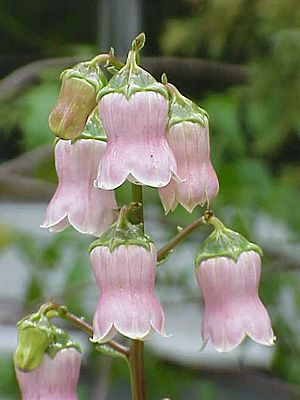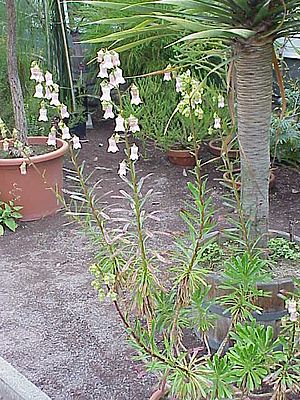Azorina vidalii facts for kids
Quick facts for kids Azorina vidalii |
|
|---|---|
 |
|
| Flowers of Azorina vidalii, detail of inflorescence. | |
| Conservation status | |
| Scientific classification | |
| Kingdom: | |
| Division: | |
| Class: | |
| Order: | |
| Family: | |
| Genus: |
Azorina
Feer
|
| Species: |
A. vidalii
|
| Binomial name | |
| Azorina vidalii (H.C.Watson) Feer
|
|
| Synonyms | |
|
See text. |
|
The Azorina vidalii, also known as the Azores Bellflower, is a very special plant. It is the only species in its group, called a genus, named Azorina. This plant belongs to the Campanulaceae family, which is also known as the bellflower family.
This unique plant is only found in the Azores islands. It is an ornamental plant, meaning people grow it for its beauty. Even though it's from the Azores, it is also grown in other countries.
The Azores Bellflower was first named Campanula vidalii by a person named Hewett Cottrell Watson. He named it after "Capt. Vidal, R.N.", who found the original plant. Later, Heinrich Feer changed its name to Azorina vidalii. He created the new genus Azorina just for this plant.
Contents
What Does the Azores Bellflower Look Like?
The Azores Bellflower is an evergreen plant, which means its leaves stay green all year. It is also a perennial herbaceous plant, so it lives for more than two years. This plant can grow quite tall, reaching about 80 to 150 centimetres high.
The plant has branches that start at its base. The lower parts of these branches are woody, making them strong. The leaves of the Azores Bellflower are a dark green color.
When Does it Flower?
This beautiful plant blooms from May all the way through October. Its inflorescence (which is how the flowers are arranged) has many hanging, waxy flowers. These flowers are pale pink and shaped like bells. There is also a special type called Azorina vidalii forma alba, which has white flowers instead of pink.
Where Does the Azores Bellflower Grow?
The Azores Bellflower is quite rare. It usually grows in rocky holes found in cliffs close to the sea. You can find it at altitudes below 50 metres. This plant often grows alongside another plant called Salicornia. Both plants can handle the salty wind that comes from the sea.
You can find the Azores Bellflower on all the islands of the Azores archipelago. However, it does not grow on the island of Graciosa.
Images for kids
 | Lonnie Johnson |
 | Granville Woods |
 | Lewis Howard Latimer |
 | James West |





